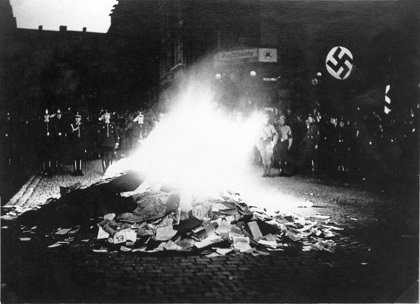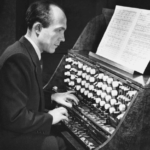 By Dorothea von Schwanenfluegel Lawson
By Dorothea von Schwanenfluegel Lawson
Here are some behind-the-scene personal experiences from the 1930’s that might be of interest.
In 1933, our Nazi government appealed to us for a nationwide “non-Aryan” boycott. I experienced the proposed boycott the hard way. One day I went to the local haberdashery I had been frequenting for years, a Jewish firm with the name of Lapp. As I approached I saw one of the new eye catching anti-Jewish pamphlets in the window: “Germans defend yourself! Buy only at Aryan stores.” An SA-man (a uniformed brown storm trooper) was planted in front with his feet wide apart, partly blocking the entrance, & I had to squeeze past him on my way inside, like many others did. When I came out with my purchase he gave me a dirty look & grunted, “Can’t you read?” On my next visit to Lapp’s store I found the SA guard posted there in a more menacing posture. This time he filled the entire doorway & gave me a very rude & sharp-tongued warning never to dare to set foot in this store again before it was “Aryanized.” I was shocked & had to turn away empty-handed. After that episode, my parents warned me to stay out of any dangerous Nazi crossfire.
And did you know what happened at the famous book burning? There was an order to get rid of all “un-German” writings. The list of outlawed books included authors such as Heinrich Heine, Thomas Mann, Sigmund Freud & even Albert Einstein. We were supposed to participate in a “patriotic” meeting at the biggest square in Muenster. Looking at the surroundings, we immediately knew that this patriotic meeting was nothing more than a mass book-burning rally. All day long the “un-German” books had been hauled in trucks & wagons by Party functionairies & piled up in the center of the square. My entire class was required to show up in the afternoon, & as usual, the teacher’s attendance list had to be handed in the following day to a supervisor. The entire proceeding was led by Nazi officials who screamed endless propaganda at us. (However, we girls did not pay much attention to them because across from us were the boys from the Schiller High School. THEY got all of our attention!)
The books were supposed to burn in a glorious bonfire. Various efforts were made, but the “un-German” literature wouldn’t cooperate. We thought the whole fiasco was hilarious & started to giggle. This got us reprimands from our teacher who urged us to put on serious faces. Obviously he understood more about our dangerous behavior than we did. They finally poured gasoline over the books. The fuel burned brilliantly, throwing ghostly shadows in the twilight, but the books resisted being consumed, & only left behind an acrid smell. When I got home that evening, I heard on the radio that 20,000 books were burned in Berlin alone. It was a cultural & political fiasco in all of Germany.
And let me leave you with a little bit of humor. The nationwide book burning really shocked us & it was only a prelude to what would follow. The way the public really felt was unmistakably demonstrated by the new political jokes that sprang up, such as this one:
A housewife goes to the public library. “I would like to check out some books for my husband. He is at home, sick in bed.” “Well,” says the librarian, “May I suggest something from the very new, highly interesting literature recommended by our present government? “No, thank you,” says the housewife. “My husband isn’t THAT sick!”
I hope there are other people out there who can share THEIR experiences of this time period. I realize that my generation is dying out, but I plan to stick around for a while longer!
You can read more about my experiences in my memoir Laughter Wasn’t Rationed.
Related articles:
Bombings and air-raids during WWII
World War Memories







